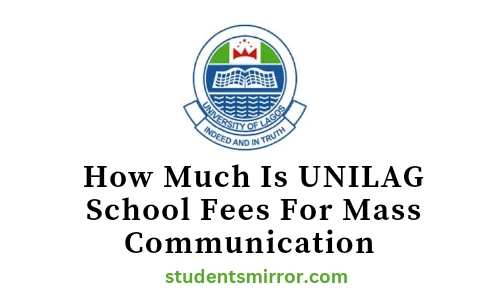If you’re an aspirant wondering how much UNILAG charges for Mass Communication, this article is for you. It contains all the necessary information about the fees for Mass Communication at the institution. While primarily focused on providing UNILAG School Fees for Mass Communication, we’ll also take a few moments to explore the institution’s Mass Communication department, its history, location, and accreditation status, among other details.
UNILAG Department of Mass Communication
The UNILAG Department of Mass Communication, established in 1966 through a collaborative effort between the Federal Government, UNDP, and UNESCO, began as the Institute of Mass Communication under the leadership of Dean Prof. S. Scotten. Its overarching goal was to serve as a central hub for training journalists in the African sub-region. Initially located in the University’s Library Complex, the department later found its home in the Faculty of Arts, resulting in the conferment of Bachelor of Arts (B.A) degrees upon its inaugural graduating class, which included students from the war-affected Jackson School of Journalism at the University of Nigeria, Nsukka.
Originally functioning as an institute that granted professional certificates and diplomas, the department transitioned to awarding degrees in 1968. This shift marked a pivotal moment in the evolution of the Mass Communication program at UNILAG. The program has since grown in stature and influence, contributing significantly to the education and training of media professionals.
Crucially, the UNILAG Department of Mass Communication Program is presently fully accredited by the National Universities Commission and various other relevant agencies. This accreditation underscores the program’s commitment to maintaining high educational standards and ensuring its graduates are well-prepared for careers in the dynamic field of Mass Communication.
In November 2023, the UNILAG Mass Communication Alumni Association announced the upcoming Annual Ball and Awards ceremony, scheduled for December 2, 2003, at the OPTS Hall, LCCI Conference Centre in Lagos. This cherished tradition serves as a unifying event, bringing together alumni from diverse fields to celebrate and recognize outstanding accomplishments and contributions.
The event, described as an exciting evening of “3Rs” – reunion, reminiscences, and recognition – promises a delightful dinner for attendees. Aliu Akoshile, the Vice Chairman of the organizing committee and Chairman of the Awards sub-committee, expressed the anticipation of a memorable gathering where alumni can reconnect, reminisce about shared experiences, and acknowledge noteworthy achievements.
In March 2023, the University of Lagos Mass Communication Alumni Association (UMCAA) took a proactive step toward supporting fresh graduates by organizing its inaugural mentoring program. This initiative aimed to bolster the preparedness of new members for the increasingly competitive labor market. Dr. Kehinde Oyesomi, the Vice-President of UMCAA and the Program Coordinator, highlighted the program’s objectives, emphasizing its role in enhancing graduates’ institutional knowledge, understanding of the labor market, confidence, and positioning for professional development opportunities.
During the session, distinguished members of the association, including veteran journalist Lekan Otufodurin, seasoned public relations professional Eniola Mayowa, and data-centric digital marketing expert Oluwatayo Alofun, served as facilitators. These accomplished individuals shared their insights and experiences, contributing valuable guidance and support to the fresh graduates. The mentoring program emerged as a significant avenue for the new graduates to benefit from the wisdom of respected UMCAA members actively engaged in mentoring the next generation, fostering a sense of community and professional growth within the Mass Communication alumni network.
Vision and Mission
The vision and mission of the Faculty of Science at the University are succinctly outlined. The vision strives for the faculty to stand as the pace-setting institution in Nigeria and beyond, excelling in the production of outstanding graduates characterized by excellence in research, learning, and character. This ambitious goal positions the faculty as a leader in scientific education and development.
The mission of the Faculty of Science is to establish a platform of high academic standards, emphasizing both research and learning within the realm of science. This underscores the commitment to fostering an environment that not only facilitates rigorous academic exploration but also encourages a holistic approach to scientific education.
UNILAG School Fees For Mass Communication
For new Mass Communication students at UNILAG, the school fees for one year are N126,325. This doesn’t include charges for the Toxicology Test and Utility, which need separate payment.
Returning Mass Communication students pay N100,750 for one academic year. This covers things like Registration, ID Card, Exams, Library, IT & Entrepreneurship, Students’ Handbook, Lab/Studio, and more. It’s the total cost for the academic services they get during the year.

